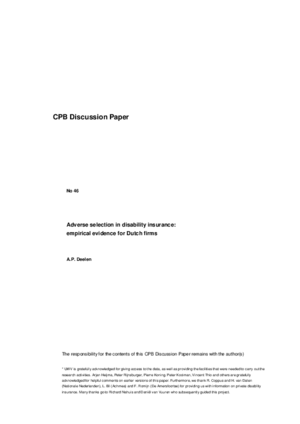Adverse selection in disability insurance; empirical evidence for Dutch firms
CPB: Tijdelijke meerkosten private uitvoering van de WGA vallen mee
We are sorry, unfortunately there is no English translation of this page.
Contacts

In this paper, we analyse the employers' decision to opt out of the public disability insurance (DI) system. For the empirical analysis we use an extensive panel of Dutch employers for the period 2000-2002.
We find that cross-subsidies employers pay or receive under the current public insurance system of experience rating contribute to the opting out decision. Since cross-subsidies are risk related, this is an indication for the presence of adverse selection: high risk (cross-subsidised) firms tend to remain publicly insured, while low risk (cross subsidising) firms tend to opt out.
This finding is supported by the fact that risk related characteristics such as the sector of industry and the composition of the work force by age and gender contribute to the explanation of the opting-out decision. Adverse selection could be diminished by setting public premiums in such a way that they are more actuarial fair in the long run. As a result, the risk profile of firms opting out will become more similar to that of firms not opting out.
Downloads
Authors

